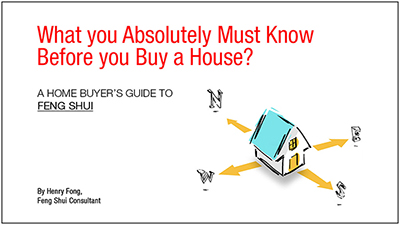Someone ask me if it is a good idea to buy a house where the previous owner had experienced great success while living in it.
Can he also benefit from the ‘good’ Feng Shui of the house that had apparently boosted the previous owner’s success?
At first glance, the argument seems logical. But it is flawed (mostly). Let me explain.
According to the ancient Chinese, a person’s success at any period of his life is a function of his luck (during that period), his fate potential, his Feng Shui and (very importantly) how he applies himself.
This is the trinity of heaven, earth and man and together it determines the degree of success that one can achieve.
To the Chinese, heaven can means the roof over earth or the sky. But really what it means, at least from the perspective of Chinese Astrology, is the cosmic forces that come from out of space.
The cosmic forces present at your birth play a big role in determining your fate potential. Since we are constantly exposure to cosmic energies (as the earth rotates around the sun), these forces also affect our luck at various stages of our life. More specifically it influences our power (or career), wealth, health and relationship luck at different stages of your life.
This is how astrologers are able to make prediction of a person’s characters and events in his lifetime by simply looking at the date and time of birth.
Even though heaven (or the cosmic forces) play a big part in your luck, other forces such as the earth (Feng Shui) and man (how we apply yourself) can further influence the outcome.
The Chinese have a saying, “Heaven and Man together as one”. Now, what does this mean? It simply mean that since heaven influence our luck, if man moves in tandem with his (pre-destined) fate and luck cycle, he can achieve greater success.
Let me explain with an example. Let’s say that this person has great power (or career) luck during the period between the ages of 35 and 44. Knowing this the person should apply himself forcefully in his career. Since the cosmic forces are behind him he stands a very good chance of achieving great success.
Now, let’s say that Heaven (cosmic forces) predicts that he is likely to lose a lot of money in a business investment around the ages of 46 and 47. Knowing this he should refrain from taking any financial or business risk during this period. It fact he should be extra careful and maybe even walk away from such deals.
By doing so, he can achieve more in his career and not lose any of his wealth. It is like ‘going with the flow’ instead of ‘padding against the current’. Disaster is more likely to hit when you go against the flow.
If we come back to the case above, you will see that the previous owner’s success is most likely not due to just Feng Shui but more significantly, by his date and time of birth (which is likely to be different from yours or mine) and how he applies himself.
In all likelihood the Feng Shui of the house is good (at least for the previous owner). In Feng Shui we observe that people who are in a good luck period tend to buy houses with better Feng Shui.
If so, does that mean that the house, generally speaking, has good or decent Feng Shui? I would think so.
We must however take note of the fact that due to a different natal chart, a house that it good for him may not be good for another. Remember the East and West Life classification and the different Guas? Remember the different optimal door opening and orientation, the different utilization of spaces within for persons of different Guas?
Another thing to consider is the concept of house luck (Xuan Kong) that can change over time. It is possible that the previous owner’s stay is during the period when the house luck is strong.
So, should you buy the house? I would recommend an audit by a Feng Shui Consultant first. 😉









